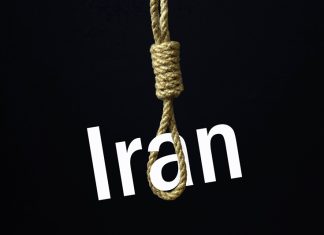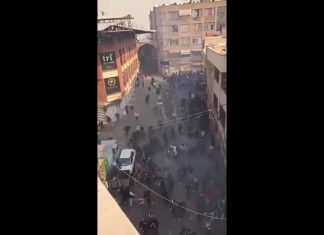By Kayhan Life Staff
On Feb. 24, authorities reportedly transferred Iranian Human Rights Lawyer Soheila Hejab from Kermanshah Prison to a hospital after she fell seriously ill, according to the U.S.-based Human Rights Activists in Iran (HRAI).
Since January 2020, Ms. Hejab has been an inmate at Kermanshah Prison’s rehabilitation cell block for women in the northwestern province of Kermanshah. Her current whereabouts and health condition are unknown, the report added.
[aesop_image img=”https://kayhanlife.com/wp-content/uploads/2022/02/soheila-hejab.jpg” panorama=”off” align=”center” lightbox=”on” captionsrc=”custom” caption=”Soheila Hejab. KL” captionposition=”left” revealfx=”off” overlay_revealfx=”off”]
“Soheila Hejab was transferred to a hospital after falling ill,” a tweet by the HRAI said on Feb. 24. “She had previously contracted the coronavirus in prison. The [prison] infirmary is closed, given there is no doctor on call. Prisoners do not have access to medical care.”
According to several unconfirmed tweets, Hejab suffered a heart attack in prison.
Civil and human rights activists and families of political prisoners have come under constant threat and pressure from the Iranian authorities. The sudden disappearance of Hossein Ronaghi, a political activist, alarmed many people. It was later discovered that security forces had taken him into custody. There is no news about his whereabouts and wellbeing.
Authorities have arrested other civil and human rights activists, including Zartosht Ahmadi-Ragheb and the father and brother of Farzad Ansari, killed during the nationwide protest in November 2019.
As far as Hejab is concerned, @DearSoodeh, on Feb. 24, tweeted: “Soheila Hejab suffered a heart attack in the women’s ward and was transferred from the infirmary to a hospital.”
Her fellow inmates reportedly took Hejab to the prison infirmary after falling ill. Prison authorities reportedly told other inmates that “they had transferred Hejab to a hospital after her condition had become critical.”
Soheila Hejab’s family does not know her whereabouts and is extremely concerned about her health and wellbeing.
Hejab and 13 other inmates in Kermanshah Prison’s rehabilitation cell block for women had contracted the coronavirus recently but received no medical care, given that the prison’s infirmary was closed and no doctors were on call.
Security forces arrested Soheila Hejab in May 2019. She was released from Tehran’s Evin Prison on March 20, 2020, after posting a $1,100 bail, pending her trial.
Branch 28 of Tehran Revolutionary Court convicted Hejab on charges of “propaganda against the state,” “unlawful assembly and collusion,” “agitating public opinion and citing unrest,” and “forming an illegal group,” handing her a 5-year custodial sentence.
On May 23, 2020, Branch 36 of Tehran Province’s Appellant Court upheld Hejab’s conviction. Subsequently, she was taken to Qarchak Women’s Prison, in Varamin 30 kilometers southeast of Tehran, before being transferred to Kermanshah Prison’s rehabilitation cell block for women on Jan. 6, 2021.
Hejab was reportedly intimidated, threatened, and physically assaulted in prison. The transfer of Hejab from Qarchak Women’s Prison to the notorious Kermanshah Prison appears to have been intended to increase pressure on her.







